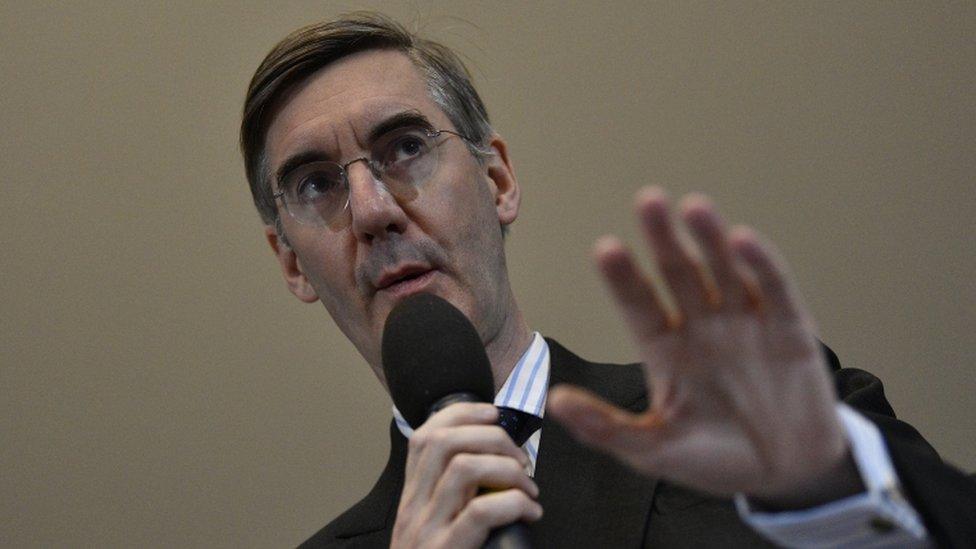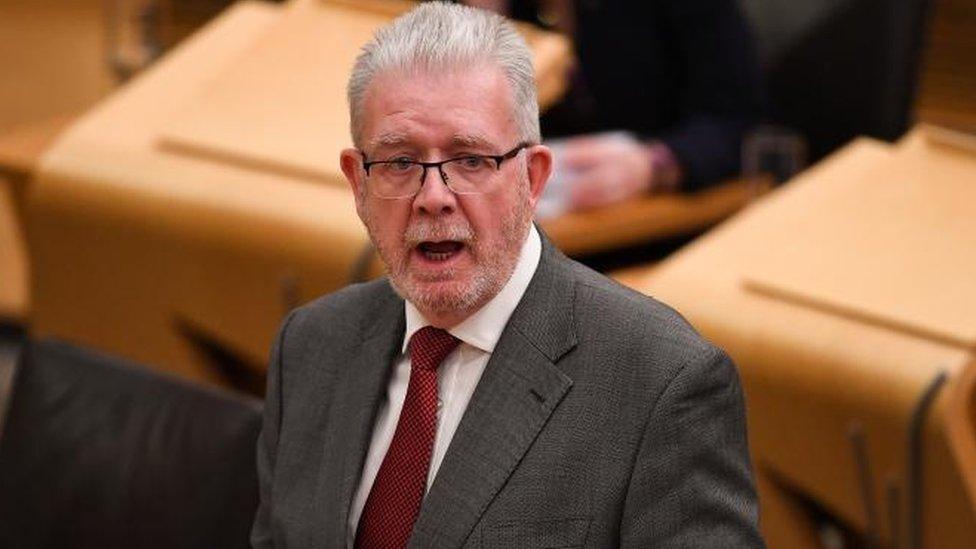Brexit and alien life forms
- Published

Jacob Rees-Mogg was comapred to an alien invasion the Scottish government's Brexit secretary
There have been times, it should be said, when an element of the surreal has entered into this prolonged Brexit discourse.
On occasion, particularly sharp exchanges have resulted in the challenge: "What planet are you on?" Faintly distressing, really. O tempora, o mores.
At Holyrood today, it all went a little further. Mike Russell, the Cabinet Secretary for Mitigating Brexit, suggested there had been an outbreak of inter-planetary intervention.
Let me explain. The Minister was challenged by Adam Tomkins, he of the Conservatives. Mr Tomkins, plainly a little exasperated, demanded to know the relative status of the Prime Minister's draft Brexit deal.
Was it, he asked, better than a No Deal Brexit? Mr Russell declined to consent to that proposal. He was, however, prepared to concede that the May Plan had the edge on "an alien invasion."
Still more exasperated, Mr Tomkins said that such an eventuality was remote. The Minister's reply? "Oh I don't know, have you seen Jacob Rees-Mogg?"
Cue grins and puzzlement. In the chair, Bruce Crawford seemed about to smile, wanly, before he thought better of it and assumed the convener's customary demeanour of solemn focus.
Mr Tomkins wasn't happy. No respect, you see, for a fellow Parliamentarian. He sought a retraction. Mr Russell duly apologised. Mr Tomkins, in suitably courteous mode, thanked him for that apology. Mr Russell muttered, sotto voce, "such as it was".
Later, Patrick Harvie of the Greens (a fitting colour, given the topic) questioned the motivations of Conservative politicians "whatever their planetary origin".
But the Minister - who, like me, wasn't born yesterday nor the day before - spotted the peril ahead. He declined to be tempted back into an analysis of alien life forms and their impact on contemporary UK policy.

Mr Russell was giving evidence to a Holyrood committee on Brexit
Which all tells us what. That folk are getting tetchy. That the absence of any clear, agreed route forward results in dialogue which might be more commonly found in a work by Pinter or Beckett.
"In the immense confusion, one thing alone is clear. We are waiting for Godot to come. "
Other than the surreal, today's committee session at Holyrood allied irritation with an inevitable absence of precision. Each side advanced its own thoughts, without any immediate evidence of correlation.
Mr Tomkins sought to turn the attack upon the SNP, suggesting that they were set to thwart plans for mutual health care arrangements with the EU, by declining to grant Holyrood legislative consent.
Now, this was perhaps pushing it a bit, given that it was the UK Government which sidestepped the issue of legislative consent with regard to the Brexit Withdrawal Bill. But no matter.
In response, Mr Russell tried smoothly sought to aggravate his interlocutor once more by presenting an appearance of calm reason.
'Sensible and sensitive'
His stance on future Legislative Consent Motions would, he said, be "pragmatic, sensible and sensitive".
Mr Tomkins' interpretation of this was that the Minister, having thrown his toys out of the pram in the previous controversy, was now seeking to gather them again. (Lacking a nanny, unlike others, he had to do it himself.)
Mr Russell demurred.
Then we were off on another course, the issue of Northern Ireland. Mr Russell said that the distinctive deal offered to NI meant that Scotland would be competing with one hand tied behind the Caledonian back.
Investors might head to NI in search of the access to the EU single market which will be available.
It should be noted, en passant, that David Mundell, the Scottish Secretary, has argued that the provisions for Northern Ireland are strictly limited in scope and entirely driven by existing arrangements.
By history, geography and armed conflict, in short, although Mr Mundell does not quite put it that way. Mr Mundell, of course, has a personal reason for arguing in this fashion, given that he implicitly threatened to resign if there were to be notably distinctive treatment for Northern Ireland.
Still, Mr Russell persisted with his broader point: that Scotland had been told that differential treatment was impossible. And lo and behold…..
In essence, he was arguing that Scotland's interests had been utterly ignored, particularly in the light of the Remain majority north of the Border.
There was a further spat between the Minister and Murdo Fraser of the Tories. Mr Fraser demanded to know whether Mr Russell had read all 585 pages of the withdrawal agreement.
The Minister readily conceded that he had not, that it would take three days and legal expertise to perform such a task - but that he had, however, skimmed the contents.
And yet, persisted Mr Fraser, you were able to condemn the document within twenty minutes of its publication. The Minister said that its direction of travel had been evident in advance and that even the briefest of glances was sufficient to confirm earlier fears.
In essence, Mr Russell argued that Brexit would be calamitous and that the notion of replacing the EU connection with trade elsewhere was a "cruel deception".
Nanoo, nanoo.